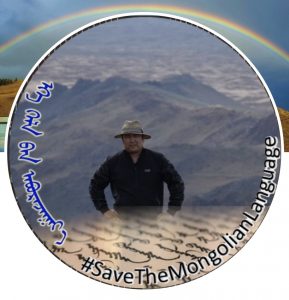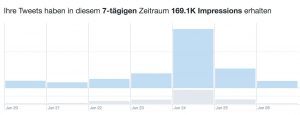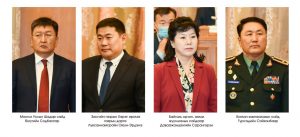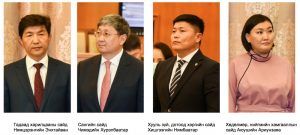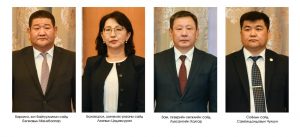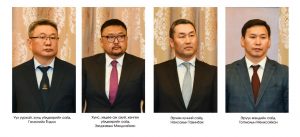By Julian Dierkes, Marissa Smith and Bulgan Batdorj
Byambajav has already provided a brief introduction to the 16 ministers who have been appointed to PM Khurelsukhs post-2020-election cabinet. Since a number of them are not MPs and have not been in the front row of policy-makers in the past, here is some additional information on their backgrounds.
Prime Minister (Монгол Улсын Ерөнхий Сайд): MP U Khurelsukh
Born 1968, Ulaanbaatar
Defense University of Mongolia (Political Science), Institute of Public Administration and Development (Public Administration), National University of Mongolia (Law), in California (1997), in Tokyo (1994), in Hiroshima (1998)
Deputy Prime Minister 2014-2015
Staff, Press and Information Department of MPRP Central Committee (1991-1996)
President of MPRP Democratic Socialist Mongolian Youth Association (1997-1999, 2000-05)
MPP Gen Secretary 2008-2012
Member of Parliament 2000-2008
Minister of National Emergency Agency 2004-06
Minister in charge of Professional Inspections 2006-08
Secretary-General, MPRP (2008 – 2012)
Deputy Prime Minister 2016-17
Prime Minister 2017-Present
Deputy Prime Minister (Шадар сайд): Ya SODBAATAR (Янгугийн Содбаатар)
Born 1974, Tsetserleg, Arkhangai
National Univ of Mongolia (1996), Mongolian Univ of Science & Technology (1997), Management Academy (2003)
Secretary, Secretary-General, MPP Democratic Socialist Youth Association (1999-2005)
Deputy Minister of Industry and Trade (2006-2008)
Deputy Head of Main Directorate for Professional Inspection (2009 – 2011)
Head of Main Directorate for Professional Inspection
Secretary of MPP (2010-2012)
Member, Ikh Khural (2012 – 2020)
Cabinet Secretary (Хэрэг эрхлэх газрын дарга): MP L OYUN-ERDENE (Лувсаннамсрайн Оюун-Эрдэнэ)
Born 1980 in Ulaanbaatar
Journalist, Lawyer
Graduated from Bers Institute
Mongolian State National University, Mongolian Education University (2008)
Kennedy School of Government, Harvard University
Worked in Governors Office of Berkh city, Khentii 2001-2002
World Vision 2002-2008
Head, Social Development Department of Bayanzurkh District Governor’s Secretariat (2008-2009)
MPP Governing Board Secretariat 2009
Head of Party Organization Department, MPP (2009-2011)
Secretary, MPP (2011-2012)
Acting Secretary-General, MPP (2012)
President of MPP SDM Youth Association (2010 – 2015)
(Sanders 217, 650)
Member of Parliament 2016-Present
Cabinet Secretary 2017-Present
Minister of Environment and Tourism (Байгаль орчин, аялал жуулчлалын сайд): MP D SARANGEREL (Даваажанцангийн Сарангэрэл)
Journalist, Graduated from Omsk Technological Institute (Russia) and University of Rostov (Russia)
Director, Editor, MM News Agency, 1995-2000
General Director, TV5 2005-2011
President, Mongolian United Association of Journalists 2005-2011
Secretary of the MPP 2011-2012
Member of Parliament 2012-Present
Minister of Defense (Батлан хамгаалахын сайд): G SAIKHANBAYAR (Гүрсэдийн Сайханбаяр)
Born 1968 in Ulaanbaatar
Graduated from Defence University (Цэргийн нэгдсэн дээд сургууль) 1985
Public Administration and Development Institute under the Government of Mongolia, 1989
National Defence University of PRC, 2002
The Military Academy of the General Staff of the Armed Forces of the Russian Federation, 2014
Specialist officer, Department of Training, Cultural Promotion and Discipline, and Head of the working group on Information, cultural promotion disciplinary work, 1994-2000
Deputy head and Head, Department of Public Administration and Management at the Ministry of Defence, 2000-2012
Head (Үүргийг түр орлог гүйцэтгэгч) of the Department of Strategic Policy and Planning at the Ministry of Defence, 2014 – 2020.
Minister of Foreign Affairs (Гадаад харилцааны сайд): N ENKHTAIVAN (Нямцэрэнгийн Энхтайван)
Born 1970
Mongolian Higher Polytechnic, Beijing City Trade University, University of Wellington, Mongolian State University, Strayer University (MBA)
Ministry of Trade and Industry (1993-1996)
Ministry of Foreign Affairs (1996-1999)
Secretary on Mongolia-China intergovernmental commission (1997-1999)
Attache for trade and economic affairs, third, second, first secretary, Mongolian Embassy in Beijing (1999-2003)
Deputy head, Mongolian Petroleum Agency (2003 – 2006)
Head, administration office, State Property Committee (2006-2008)
Trade and Economic Adviser, Beijing embassy (2008-2011)
Head, Foreign Trade and Economic Cooperation Directorate, Ministry of Foreign Affairs (2011-2012)
Adviser to the Deputy Prime Minister (2015)
Work Service Chief, MPP parliamentary group (2016 – 20)
(Sanders 2017, 295)
Minister of Finance (Сангийн сайд): MP Ch Khurelbaatar (Чимэдийн Хүрэлбаатар)
Born 1968 in Ulaangom, Uvs
Economist, Graduated from the Financial and Economic Institute (Leningrad, Russia), Higher School of Finance and Economics (1991) and University of Sydney (Australia) (1998)
Lecturer, Mongolian State University 1998-2000
Adviser, Economic Affairs, to PM N. Enkhbayar (2000 – 2003)
State Secretary of the Ministry of Finance and Economy, Chair, National Council of the Millennium Challenge Foundation, 2003-2007
Member, General Election Committee, (2004)
Minister for Energy 2008-2012
Member, MPP Little Khural (2005, 2007, 2013)
Head, Government Affairs Directorate, S. Batbold’s government
MPP Secretary, Western Region (2013)
Chairman, Standing Committee of Ikh Khural on Budget (2016 – 2020)
Member of Parliament 2008-Present, (Uvs)
(Sanders 2017, 472)
Minister of Justice and Internal Affairs (Хууль зүй дотоод хэргийн сайд): Kh NYAMBAATAR (Хишгээгийн Нямбаатар)
Born 1978, in Ulaanbaatar.
Teacher, Orkhon University (2000-2007)
Lawyer, Mongolian Defense Lawyer’s Association
Songionokhairkhan District Governor’s office
Head, State Administration and Leadership Department
Acting Director of Governor’s Office, (Songinokhairkhan?)
Chairman of Songinokhairkhan District Citizens’ Representatives’ Khural (2012)
Deputy Chairman, Songinokhiarkhan District MPP Committee
Vice President of MPP SDM Youth Association (2015 – ?)
Member, Ikh Khural (Songinokhairkhan) (2016-2020)
2016(?) income declaration — 30 million MNT income, savings of 15 million, shares in Erdenes Tavan Tolgoi and Best Drilling
(Sanders 2017, 633)
Member of Ikh Khural, 2020 – 2024 (Songinokhairkhan)
Minister of Labour and Social Protection (Хөдөлмөр, нийгмийн хамгааллын сайд): A ARIUNZAYA (Аюушийн Ариунзаяа)
Born 1980, Ulaanbaatar
Moscow International Relations University (1996-1999), college in Germany, Hannover University, Leadership Academy (2014-2015)
Manager, Human Resources, Mongol Daatgal Insurance Company (2005-2015)
Head of the Party Organization, Strategy, and Planning Directorate, head of economic policy, head of socio-economic policy, MPP (2013 – 2016)
MPP Little Khural (2013 – ?)
(Sanders 2017, 66)
Chairperson, National Statistical Office of Mongolia in 2016-2020
Minister of Construction and Urban Development (Барилга, хот байгуулалтын яам): Begjav MUNKHBAATAR (Бэгжавын Мөнхбаатар)
Born, 1975, Ulaanbaatar
University of Science and Technology (1993), Mongolian State University, East London University business school (2004-2006)
Mongolian Democratic Socialist Students’ Association (1998-2001)
Senior Political Worker, Ulaanbaatar Committee of MPP (2001-2002)
Deputy head, State Administration, Management, and Cooperation Department, Ministry of Education, Science, and Culture (2002- 2004)
Head, External Relations Department, Ministry of Education, Science, and Culture (2002 – 2004)
Director, City Policy and Planning Strategy Office, Ulaanbaatar Governor’s Secretariat (2006-2008)
Chairman, Council of the Ulaanbaatar Section of the Mongolian Democratic Socialist Youth Association (2008)
Governor, Bayanzurkh District (2008 )
Deputy Governor of Ulaanbaatar (one of four) (2008 – 2012)
MPRP Little Khural (2009 – ?)
Chairman, UB MPRP Committee (2009 -2012)
Member, MPRP Leadership Council (2009)
Candidate, Ikh Khural Election, MPP, Bayanzurkh and Nalaikh (2012)
Member, Little Khural of MPP (2010 – 2016(?))
(Sanders 2017, 601)
Board Member, Oyu Tolgoi LLC in 2016-2018
CEO of Erdenes Oyu Tolgoi (2016 – 2018)
Deputy Minister of Construction and Urban Development 2018-20
Minister of Education and Science (Боловсрол, шинжлэх ухааны сайд): L TSEDEVSUREN (Лхагвын Цэдэвсүрэн)
Born 1967
Graduated from the Mongolian Law School in 1994, and Management Academy and Public Administration School with Master’s degree in Law in 2005.
Legal advisor to the Ministry of Culture, 1994-1996
Legal advisor, and assistant to the minister, Department of Public Administration at the Ministry of Enlightment., 1996-2000
Legal advisor and Head of Unit, Department of Public Administration, Ministry of Enlightment, 2000-2004
Head of the Department of Public Administration and Management, Ministry of Education, 2004-2017
Head of the Department of the Legal Affairs, Ministry of Education, 2019-2020
State Secretary, Ministry of Education, in 2020 before his appointment as the Minister.
Minister of Road and Transport Development (Зам, тээврийн хөгжлийн сайд): L KHALTAR (Лувсангийн Халтар)
Born 1967 in Darvi soum Khovd Aimag.
Graduated from St.Petersburg State Transport University in 1990, and the St Petersburg State University of Railway Communications in 1999, a trained engineer and holds a Ph.D.
A cleaner at the office of the Ulaanbaatar Railroad jointly owned institute (хувь нийлүүлсэн нийгэмлэг), 1983
Heaver (ачигч) of trade depot at the Ulaanbaatar Railroad, 1983-1985
Teacher at Railroad College of Ulaanbaatar Railroad, 1990-1992
Deputy head, Loading, and offloading command, Ulaanbaatar Railroad, 1992-1993
Director of the Freight Forwarder Center, Ulaanbaatar Railroad, 1993-2006
Deputy Director, Management Authority, Ulaanbaatar Railroad, 2006-2018
Deputy Minister Road and Transport Development 2018-2020
Ministry of Culture (Соёлын сайд): S CHULUUN (Сампилдондовын Чулуун)
Born 1977 in Bayantsagaan soum, Tuv Aimag.
Graduated from the National University of Mongolia as Historian and History teacher, 1999 and 2000. He holds PhD and Academic title (академич цолтой)
Researcher at the Institute of History, Science Academy of Mongolia, 1999-2001
Teaching at the History Department, National University of Mongolia, 2004-2006
Deputy Director, National University of Commerce and Business, 2006-2009
Academic Secretary-General (Эрдэмтэн нарийн бичгийн дарга) at the School of Social Science at the National University of Mongolia, 2009-2010
Director of the Institute of History, Science Academy of Mongolia, 2010-2015
Director of the Institute of History and Archeology, Science Academy of Mongolia, 2015-2019
Director of the Institute of History and anthropology, Science Academy of Mongolia, 2019-2020
Minister of Mining and Heavy Industry (Уул уурхай, хүнд үйлдвэрийн сайд): G YONDON (Гэлэнгийн Ёндон)
Born 1967 in Ulaanbaatar
Graduated from Irkutsk State Technical University as mining and metallurgy engineer, 1991, Mongolian Engineer Advisor and holds PhD
Researcher at the Institute of Mining, 1991-1998
Metallurgist and Chief Metallurgist at Bor Ondor, Metallurgical Plant, at “Mongolrostsvetmet”, State-owned enterprise, 2002-2007
Director of the department at “Mongolrostsvetmet”, State-owned enterprise, 2007-2009
Director of the “Shijir Alt” factory, “Mongolrostsvetmet”, State-owned enterprise, 2013-2017
Deputy Director of the Ulaanbaatar Representative Office of Erdenet, State-owned enterprise, 2017-2018
Deputy Director, Production, “Mongolrostsvetmet”, State-owned enterprise, 2018-2020
Minister of Food, Agriculture and Light Industry (Хүнс, хөдөө аж ахуй, хөнгөн үйлдвэрийн сайд): Z MENDSAIKHAN (Загджавын Мэндсайхан)
Born 1979, Myangad soum Khovd Aimag.
Attended 10-year middle school in Myangad, Khovd
Institute of Finance and Economics of Mongolia (2001), Management Academy (2008)
Executive director and director-general of a private company (2001 – 2014)
Head, Budgetary Investment Directorate, Ministry of Finance (2015-2016)
State Secretary, Ministry of Energy (2016 – 2019)
(Sanders 2017, 521)
Minister of Energy (Эрчим хүчний сайд): N TAVINBEKH (Нансалын Тавинбэх)
Born 1971.
Graduated from the University of Science and Technology, Management Academy in 1994, 2005. Electrical Engineer holds Masters in Business and Energy.
Electrician, head of unit and engineer with the Maintenance department, Baganuur Electricity and Network, 1995-2001
Deputy Director, Chief Engineer at “Baganuur South-Eastern Region Electricity Distribution Network“, 2001-2007
Executive Director, “Baganuur South-Eastern Region Electricity Distribution Network” LLC, 2007-2013
Mayor of Baganuur city, 2015-2017
Executive Director, “Baganuur South-Eastern Region Electricity Distribution Network” LLC, 2017-2020
Minister of Health (Эрүүл мэндийн сайд): T MUNKHSAIKHAN (Тогтмолын Мөнхсайхан)
Born 1983 in Ulaanbaatar.
Graduated from the Mongolian National University of Medical Sciences, 2006 and 2013, Medical Doctor, with master’s degree in Medicine.
Doctor, National Trauma and Orthopaedic Research Center of Mongolia, 2008-2014
Head of the surgery department, National Trauma and Orthopaedic Research Center of Mongolia, 2014-2018
Director-General, National Trauma and Orthopaedic Research Center of Mongolia, 2016-2018
Director-General, State Hospital Central Hospital #1, 2019-2020
Sources for the information in this post include:
Alan J. K. Sanders’ Historical Dictionary of Mongolia, Fourth Ed., Lanham: Rowman & Littlefield, 2017)
(https://gereg.mn/news/58954)

 Follow
Follow